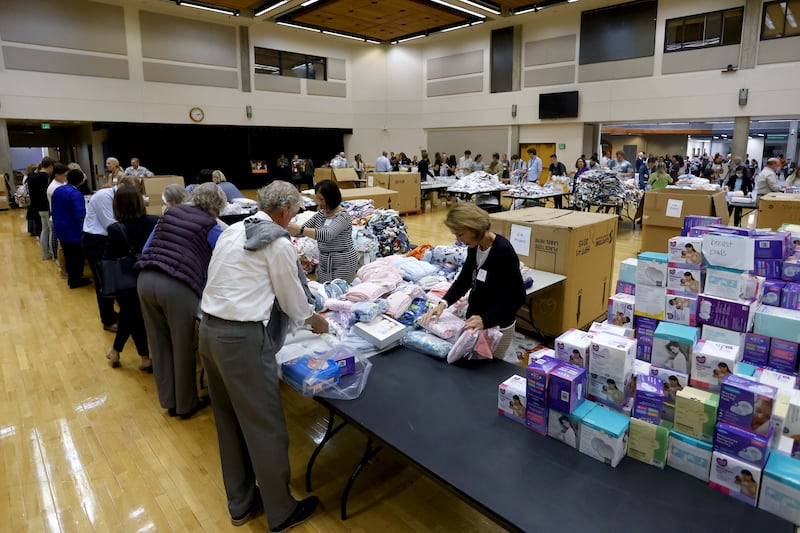If you’re attending an international conference to discuss ways to eradicate poverty, erase hunger and care for a record number of refugees worldwide, and you’re doing it in the state that regularly ranks No. 1 for volunteerism, you should hardly expect to just talk for three days.
Hundreds of delegates to the United Nations’ “Why it Matters” conference at Utah Valley University teamed up with the community service program JustServe.org and The Church of Jesus Christ of Latter-Day Saints on Thursday to assemble about 2,000 newborn kits for refugee and immigrant mothers.
Items for the kits, ranging from blankets to baby bottles and pacifiers, all new items, were donated and collected from LDS congregations and other contributors throughout Salt Lake and Utah counties.
“Hearing stories is wonderful,” Baldomero Lago, UVU’s chief international officer and the organizer of the conference, said, “but I wanted to make sure we would roll up our sleeves. I wanted to make sure we really mean what we’re talking about.”
Lago said he wanted conference delegates to return to their homes knowing they helped some refugee mothers while they were in Utah.
The project was similar to one Lago organized for the U.N. Civil Society Conference held in Salt Lake City in 2019. That event was the U.N.’s first such conference ever held outside New York City.
Allison Drew, who, with her husband Craig, serves as Utah director of large-scale humanitarian service projects for the church, said the Utah response to a JustServe.org listing for donations, as well as the church’s support, has been tremendous.
“Eight weeks ago we had nothing, and look at what we have,” she said, motioning toward a UVU ballroom filled with items that had been collected and stored for weeks at various Deseret Industries locations.
The Drews have a two-page list of charities in Utah that will receive the kits. Many of those charities were started by “women who themselves had a very difficult transition to Utah,” she said. “They didn’t know the language, didn’t have health care. They were pregnant. They didn’t have a lot of transportation. And then they decided ‘I’m going to do something. I’m going to make a difference.’ So, a lot of these are grassroots organizations.”
In many ways, the service project was a fitting exclamation mark for the three-day conference that ends Friday. The conference focused on the United Nations’ 17 global sustainability goals, but nearly all of those goals could be applied to fixing various symptoms that lead people to flee their homelands.
People in the United States, living in relative peace and comfort, are mostly insulated from a global refugee crisis of epic proportions. A brief from the U.N. Refugee Agency, dated May 27, said, “The number of people forced to flee violence, conflict, human rights violations and persecution has crossed the milestone of 100 million for the first time on record.”
The number has been propelled by the war in Ukraine, but other conflicts had already pushed the total past 90 million at the end of 2021.
In addition to those forced to flee because of conflicts and violence, officials at the conference said another 21.5 million are displaced each year because of weather and other natural disasters, such as Hurricane Ian, which recently ravaged Puerto Rico and parts of Florida.
Many of these refugees are resettled in Utah. The conference featured a panel of six young refugees on Wednesday from war-torn countries who shared their resettlement stories. Utah has accepted refugees recently from Afghanistan, Ukraine and several other nations. Seventeen years ago, many refugees from Hurricane Katrina in New Orleans were relocated to Utah, where some built new permanent lives.
Unlike many other parts of the country, people in Utah tend to be aware of the refugees in their midst because their volunteer spirit ensures they will cross paths.
As the Deseret News reported this week, that spirit was dampened somewhat by the COVID-19 pandemic, which forced people to isolate for a time, causing some charities to close. But those volunteers have re-emerged and now are approaching pre-pandemic levels.
A recent report by 24/7 Wall Street found that more than half the people in Utah volunteered in the last year, a force totaling nearly 140 million hours and contributing a value Americorps estimated at $3.2 billion.
That alone may have been the greatest lesson taught at the U.N. conference. If every First World region of the world could develop a healthy spirit of volunteerism, the resulting good would be staggering, and all without any tax money.
“All of us want to be good,” Allison Drew said about people in general. “We all want to do good in the world. We want to feel like we made a difference.”
The delegates who attended the conference at UVU can return home knowing that they did, and not just in the ideas and strategies they shared.


